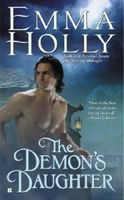 I'm a big fan of Emma Holly. I've loved her erotica (ahhhh, Menage!), her historicals (ahhh, Beyond Seduction!) and the couple of her paranormals that I've read (ahhhh, The Night Owl!). The Demon's Daughter (excerpt) combines elements of each of the three.
I'm a big fan of Emma Holly. I've loved her erotica (ahhhh, Menage!), her historicals (ahhh, Beyond Seduction!) and the couple of her paranormals that I've read (ahhhh, The Night Owl!). The Demon's Daughter (excerpt) combines elements of each of the three.
Oh, and that cover? I'm not the world's biggest fan of man-titty covers, but I thought this one was particularly attractive. The guy seems to be Pocket's Cover Model Muse, as P.Devi says ;-)
Inspector Adrian Philips keeps the peace between demons and humans in Avvar, a city not unlike Victorian London. To do his job, he's allowed his strength to be enhanced by demon technology, a choice that's cost him his wife, his family and—some would say—his humanity. Rejected by both races, he hungers for a woman's touch.
Roxanne McAllister is an outcast, too: the illegitimate daughter of an infamous chanteuse. One fateful night brings Roxanne and Adrian together, and though the border between human and demon is treacherous, these two may be just the ones to cross it. The question is, will the exquisite pleasure they find together be worth the risk...
Do you know what
Steampunk is? I didn't, not until
Maili mentioned that's what
The Demon's Daughter was. I've since watched some movies which qualify, and I agree. It
is steampunk, and it
is pretty good! A
B+.
For those of you who, as I was, are baffled by the term,
Wikipedia defines steampunk as:
Steampunk is a subgenre of speculative fiction, usually set in an anachronistic Victorian or quasi-Victorian alternate history setting. Fiction in the steampunk genre is set in the past, or a world resembling the past, in which modern technological paradigms occurred earlier in history, but were accomplished via the science already present in that time period.
TDDdoesn't
exactly fit this definition, because those "modern technological paradigms" occurred, not via the "science already present in that time period", but via the discovery of a hidden civilization which was more technologically advanced. However, it does have a certain steampunk feel to it.
Ok, on to the story. It's set in an alternate universe, a Victorian London-ish kind of city, Avvar. Not too long before our story takes place, an expedition to the frozen North had found a hidden civilization, the Yamas. I won't go into detail about them, because it would take paragraphs and paragraphs, so just the basics here: the Yama look pretty much human, but they can do a certain amount of telepathic communication, they feel no emotions (at least, they tend to feel much less than humans do) and they can "feed" off humans' "etheric force". They are also much more technologically advanced than humans, so in exchange for their technology, the citizens of Avvar have agreed to receive the lower caste Yamish (or "demons" as they're also called). There is a good deal of xenophobic feeling against them (as you've probably deduced from their being called demons), but things tend to be peaceful between them and humans.
Our hero is Adrian Phillips. He's a policeman, and very much an outsider. See, for all that peace is the norm between the Yamas and humans, sometimes there are problems, and since Yamas are much stronger than humans, policemen could only stop them by killing them. Adrian is part of an experimental force which has had Yamish implants put in, which make them much stronger and allows them to police the Yamas better. Of course, his implants have also made Adrian even more of an outcast, because his fellow police now feel he's tainted by those demon implants.
As the story starts, Adrian is a man hungry for some human warmth. He's just come out of a marriage to a woman who was cold, both physically and emotionally, and his supposed friends' treatment just adds to his feelings of loneliness.
He finds all the warmth he needs in Roxanne McAllister, when he gets hurt during a mission in the slums and the last thing he can do before he collapses is climb on to a building right at the edge of this area. He's rescued by Roxanne, just as much of an outcast as he is.
Roxanne is the daughter of a famous opera singer, La Belle Yvonne, and has quite an interesting past. After her mother died and left her alone very young, Roxanne did a stint as a sailor in an all female ship. After retiring, she took up art, and is well known for her classic nudes, though she used to specialize in erotic pictures, which some people called pornography. Roxanne lives with two boys she rescued from the street, the teenaged Charles and five-year-old Max, and they have become her family.
Roxanne and Adrian share an instantaneous, combustive attraction, which soon develops into love. But if Adrian wants to progress in his career, which is more a calling than just a job for him, he can't be with a woman who hasn't got a spotless reputation, and Roxanne's is far from it.
And if that wasn't enough conflict, there's the fact that Roxanne has just found out that her father is actually a Yamish diplomat, and this man wants a relationship with her. And not only that, her father has to do some very delicate manouvering, because it's unheard of that a human become pregnant by a Yama, so he fears his bosses might want to steal Roxanne away in order to study her.
Well! That was complicated, wasn't it? However, I'm glad to report that it wasn't at all hard to follow in the book. The complicated plot, the complicated universe, I thought Holly did very well in introducing everything bit by bit, without any boring info-dumps.
Also, for all that the setting was fascinating, it didn't overshadow the romance at all. Roxanne and Adrian's relationship was really sweet and steamy, and I loved the way each made the other feel less alone. Adrian, especially, is a wonderfully done character. I appreciated that he really sacrificed a huge deal for Roxanne, and this sacrifice was even more meaningful to me because of all his initial doubts about whether or not he should do it. I mean, if he'd instantly given up all his dreams and hopes for Roxanne, then I guess I would have felt they didn't mean all that much to him in the first place. But the way Holly sets up things, you do get a feel for the real meaning his sacrifice had.
I think I enjoyed the secondary relationships just as much as the romance. I loved to see Roxanne and Adrian with Charles and Max, and I loved the slowly developing relationship between Roxanne and her father. When the book was over, I wanted more!
Oh, well, it looks like I won't get it. I guess
TDD wasn't too well received, because Holly doesn't seem to be planning to write any more books in that universe. That's just too bad. I didn't find out nearly as much as I wanted about Avvar and the Yamas here, either. There were some truly tantalizing hints there, and I would love to see Holly explore them. No way to do that in this book without the setting taking over the story, but maybe if she had a few more books?
Edited to add: I was too hasty. Looks like Holly's short story in the
Hot Spell anthology is set in this universe! Oh, cool, now I want that book even more, if that's possible!
Read more...
 My body spent these last 11 days in Punta del Este (most of them lying on the same beach lounger... you'd identify it by the butt-shaped depression on it), but I didn't.
My body spent these last 11 days in Punta del Este (most of them lying on the same beach lounger... you'd identify it by the butt-shaped depression on it), but I didn't.  No, that's not quite where I'm going, and I don't have a hammock (bummer!), but I am planning to do absolutely nothing but read and rest and just generally laze around all over the place, so the photo seemed appropriate.
No, that's not quite where I'm going, and I don't have a hammock (bummer!), but I am planning to do absolutely nothing but read and rest and just generally laze around all over the place, so the photo seemed appropriate.  The plan is to go to
The plan is to go to 



 I'm a big fan of
I'm a big fan of 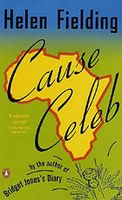
 What usually happens when I read a rave about a book in one of the message boards I frequent, is that I think "Ohhh, that sounds good! Too bad I still need to order it / it's on its way here / it's at my friend's house in the US and hasn't yet shipped". That wasn't the case with
What usually happens when I read a rave about a book in one of the message boards I frequent, is that I think "Ohhh, that sounds good! Too bad I still need to order it / it's on its way here / it's at my friend's house in the US and hasn't yet shipped". That wasn't the case with 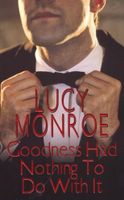

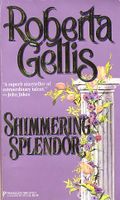





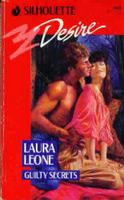 In January, I only barely managed to keep with my only reading resolution for this year: to read at least two books each month that have been in my TBR for over 3 years. I read the first one that fit that criterium early in the month,
In January, I only barely managed to keep with my only reading resolution for this year: to read at least two books each month that have been in my TBR for over 3 years. I read the first one that fit that criterium early in the month, 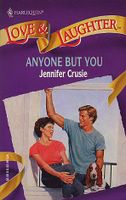 My favourite
My favourite  This probably won't interest anyone but me, so I'll keep it really short. The book's full title is Historia de la sensibilidad en el Uruguay. Tomo I: La cultura "bárbara" - 1800 - 1860, which I would translate as "A History of the Uruguayan Sensibility. Book I: The "barbarian" culture". That might not be a truly literal translation, but it describes the spirit of the book better.
This probably won't interest anyone but me, so I'll keep it really short. The book's full title is Historia de la sensibilidad en el Uruguay. Tomo I: La cultura "bárbara" - 1800 - 1860, which I would translate as "A History of the Uruguayan Sensibility. Book I: The "barbarian" culture". That might not be a truly literal translation, but it describes the spirit of the book better. 








